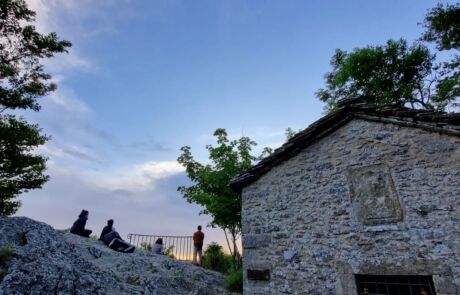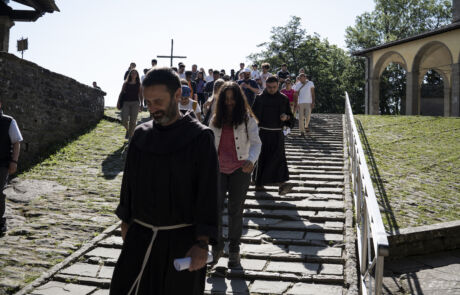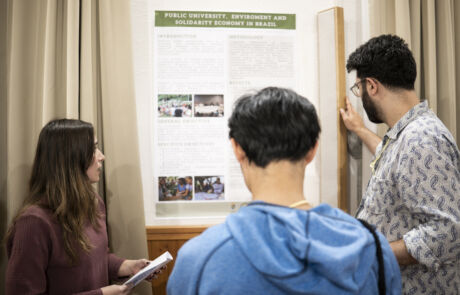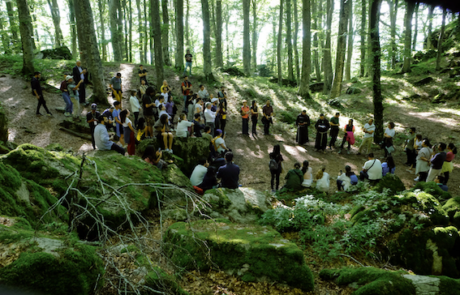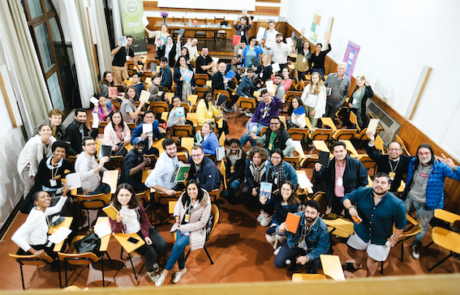
INTERNATIONAL
SUMMER SCHOOL 2024
Homo Mendicans
Companionship, Wandering, and the pursuit of Joy
LA VERNA – FRANCISCAN SANCTUARY (Chiusi della Verna – AR – Italy)
September 1 – 6
“Which is the path, then, for those who want to renew the economy from its roots?
The pilgrims’ journey has always been risky, interwoven with trust and vulnerability.
Those who undertake it must soon recognize their dependence on others along the way:
thus, you understand that economics too is a borrower of other disciplines and knowledge”
Pope Francis to the EoF community
San Francesco wanted his friars to be mendicants, conducting a frugal life but rich in fraternity, wandering, and preaching, in close connection with the poor and poverty. This was his recipe for the perfect joy. The mendicants started their journey with little or nothing, relying on the essential generosity of nature.
On their long journeys, they learned to trust strangers and to depend on each other in the spirit of reciprocity and benevolence. How far the homo oeconomicus – built upon the ideals of individualism, independence, and autonomy – come from this lifestyle, and how distant is our present notion of subjective well-being from San Francesco’s idea of perfect joy!
Inspired by the suggestions of Pope Francis, our summer school will explore the mendicant way and test its suitability in our post-modern times.
The five days will revolve around five macro-topics:
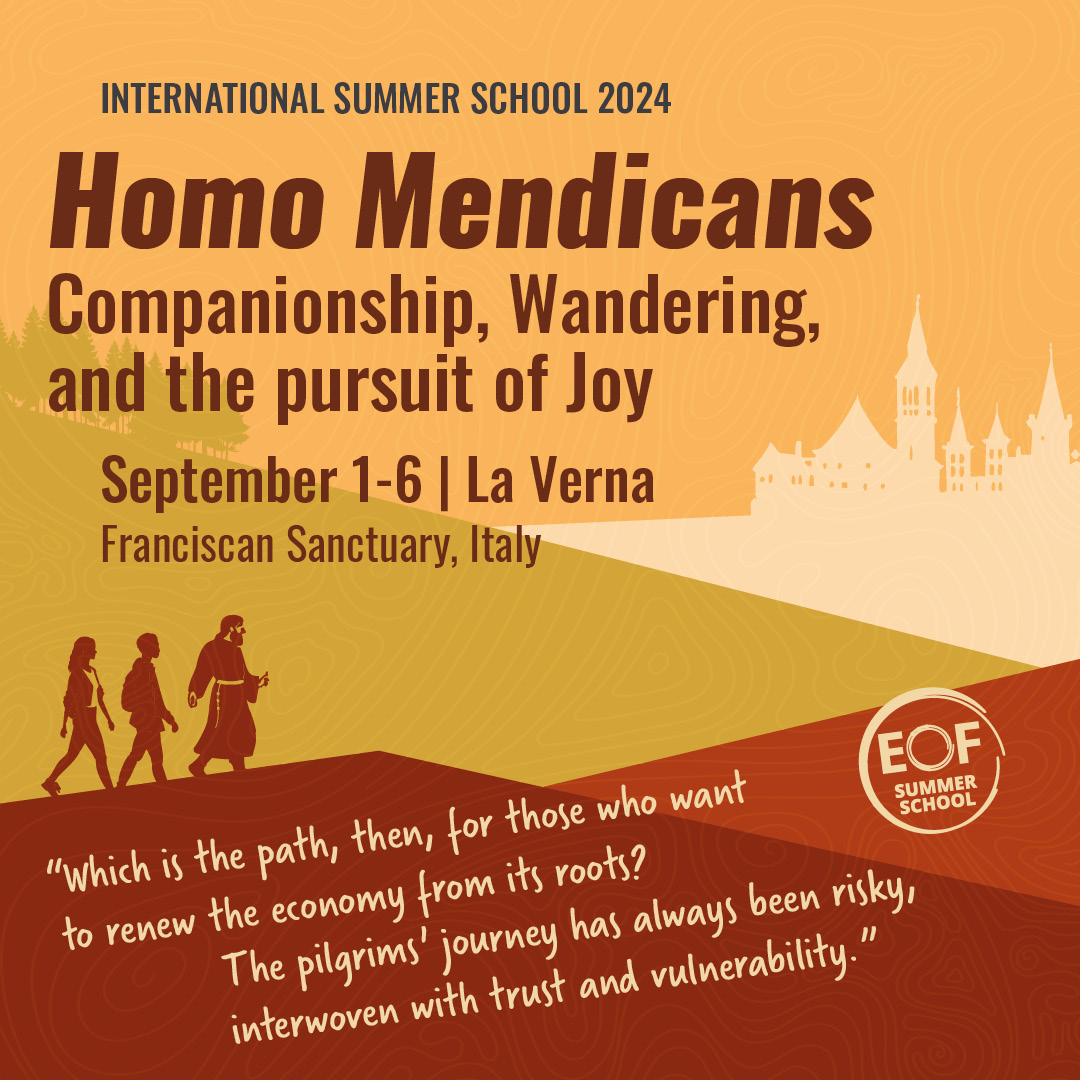
- Prophecy of Mendicants and Friars: “Nobody but a beggar chooses to depend chiefly upon the benevolence of his fellow-citizens.” This quote from Adam Smith’s Wealth of Nations well represents the contrast between the economic man, independent and self-interested, and mendicants conceived as beggars. And yet, in the Middle Ages, the figures of the mendicant-pilgrim and the merchants were juxtaposed. Mendicant, in fact, is not only a person begging for something, but it expresses something more profound, the existential condition of being partial, finite, incomplete, and therefore connected to others. We are all mendicants, as we are all incomplete and need recognition and help from our fellows. Augustine wrote that humans are dei mendicus, in need and search of God, but we are also homini mendicus, in need and search of others.
What is the ethical prophecy of the homo mendicans? We will explore the economic history of the mendicant orders to explain new elements brought, for example, by Franciscans and their form of life of the highest poverty (within its economic and theological roots). Such insights resonate deeply with the ethos of the Economy of Francesco community, which seeks to forge a more inclusive and sustainable economic framework rooted in fraternity, sorority, and mutual support.
- Beyond Happiness: Pursuing the Perfect Joy: Happiness studies are an established field in Economics. Scholars focused on the subjective and objective dimensions of well-being, the relation between income and self-reported happiness, and the psychological mechanisms that drive preferences and consumption. St. Francis Perfect Joy (Perfetta Letizia) was something different from what was later called happiness. Joy has a lot to do with relationships: we cannot make ourselves happy; we need someone to make us happy, to make others happy, to make each other happy. Joy is a virtue which, like every virtue, must be cultivated and cared for throughout one’s life. Perfect joy, then, arises from loved wounds, in oneself and in others, and which thus become blessings, for oneself or, more commonly, for others. For St Francis to know Perfect Joy, one must be poor. It is to the poor that the “good news” comes because of chosen poverty, which is, therefore, neither destitution nor misery and is the pre-condition that allows us to be happy. This is a scandal for modern times, especially for modern economics.
What does Perfect Joy entail? What is its revolutionary message for our modern times, particularly for happiness & economics studies? In embracing St. Francis’ notion of Perfect Joy as a catalyst for reimagining happiness and economics, we embark on a journey towards a more comprehensive understanding of well-being, rooted in compassion, solidarity, and the pursuit of a more just and inclusive economic paradigm.
- Fraternity and Sorority beyond Individualism: In Fratelli Tutti, Pope Francis stated his idea of fraternity and sorority. And he told us this by choosing the parable of the Good Samaritan. By choosing this parable, he made a strong and partial choice. He told us that his idea is a universal fraternity and sorority centered on the victim. A partisan and partial choice, because the ethics of the Samaritan is certainly a solid and unequivocal basis for a civilization of proximity and mercy, but it is less obvious as the foundation of the ethics of fraternity and sorority, because it lacks the decisive dimension of reciprocity. It is less obvious because fraternity and sorority are not just the content of the individual’s action, it is not just a command addressed to each of us taken in isolation; fraternity and sorority are also, and perhaps above all, a command addressed to us as a community, church, society, humanity, a verb conjugated to the plural form.
We will explore the multiple dimensions of fraternity and sorority, being helped by the prophecy of the two Francesco (the Saint and the Pope), and we will try to understand their relevance for contemporary Economics and economic life.
- Beyond Profit: Embracing Purposeful Commerce through the Franciscan Lens: The Christian tradition long condemned the pursuit of profit. And yet, in the Middle Ages, there were some prophetic exceptions. Before being theologians, the Franciscans were careful observers of reality, especially that of the new Italian and European cities; they were less interested in abstract and deductive disputes and much more in understanding people’s actual behavior. For this reason, they observed the practices of the merchants, and they knew about the economic and civil changes in a very dynamic time. Since the time of St. Francis, the Franciscans had developed a secular order more than other religious orders: the Third Order. They had lay people within their charismatic community, among them many merchants. They knew them, they were their brothers. Before judging them, they were their friends, and they knew their hearts. The first good words about the market and profit were born during some fraternal meal, when some merchant-brother confided in them about his difficult and even risky profession. And having seen the soul of a merchant, those theologians saw a different soul of the market. They first loved and esteemed the merchants, then the markets. Profit is not necessarily bad or vicious. It depends on the purpose that is attached to it.
Imagining a generative relation between purpose and profit today means rediscovering that sight of the Franciscans, together with their love for merchants and markets. It means understanding how businesses can realize personal and social purposes while being profitable and competitive.
By embracing the Franciscan approach, we pave the way for businesses to thrive not only in financial terms but also in their contribution to societal well-being. This ethos underscores the imperative of fostering inclusive economies that prioritize the dignity and flourishing of all individuals, echoing the principles at the core of the Economy of Francesco.
- Marching Towards Change: Exploring the Power of Collective Movement in Social Transformation: There is an unexplored yet crucial link between social change and marching. We do not lack examples: from Ghandi’s Sal March of 1930 to Martin Luther King’s March on Washington of 1963, from ancient and modern pilgrimages to every day marches for social, economic, and civil issues.
Mendicant orders, as Franciscans and Dominicans, also emerged from the idea that the Gospel should not stay static in cloisters but walk around people in the streets, the cities, and the countryside. Marches usually have a goal, something to achieve for which people walk together. Sometimes, also spontaneous gatherings, walking for the sake of walking, and wandering unite people in a shared experience.
Before the idea and the goal, it is the simple act of walking together that bonds people. Recognizing the transformative potential of collective movement underscores the importance of communal action in addressing contemporary social and economic challenges. By embracing the ethos of solidarity and shared purpose exemplified by marches and pilgrimages throughout history, we are reminded of the power inherent in coming together to effect positive change. This ethos calls us to transcend individual interests and unite in a common journey toward building a more just and equitable world, where the marginalized are uplifted and the dignity of every human person is upheld.
Lecturers:
Luigino Bruni, LUMSA University
Helen Alford, ANGELICUM – Pontifical University of St. Thomas Aquinas
Alessandra Smerilli, DICASTERY for Promoting Integral Human Development
Paolo Santori, TILBURG University
Matteo Rizzolli, LUMSA University
—
Coordinators: Paolo Santori, Assistant Professor – Tilburg University | Matteo Rizzolli, Associate Professor of Economic Policy – LUMSA University | Martina Tafuro, Sant’Anna School of Advanced Studies | Enrico Marcazzan, Sant’Anna School of Advanced Studies
Secretariat: Valentina Erasmo – University of Turin, EoF Academy Research Fellow
To whom it is addressed and what it offers
The EoF International Summer School targets Master’s and Ph.D. students, postdocs, and junior researchers in the field of Economics and related Social Sciences. The number of participants is limited in order to ensure an ideal ratio between students and lecturers. Students attending the Summer School intensify their knowledge in their fields of study and research and will have the opportunity to get to know peer-leading researchers in an interdisciplinary, co-generative environment. Although the Summer School intends to bring together science academics from different countries, it also encourages the participation of practitioners in the field. This enables mutual enrichment and dialogue between theory and praxis. Participants in Summer School will not just be passive learners. Conversely, after acceptance, calls for paper and call for posters will be circulated so that everyone can be actively involved in the process of learning.
The choice of venue, La Verna, located in the Tuscan Apennines, was purposely selected for the peculiar experience it offers to the attendees who have the chance to discover the spiritual abundance in the life of St. Francis and the unique landscape and natural beauty. In this regard, online participation for the entire week-long course is not available. The program comprises of a full-time mix of lectures and workshops, taught by EoF professors, and other invited leading scholars. The program also includes a number of relevant field trips and cultural events.
PROGRAMME
Sept. 1 – Welcome Day
from 17:00 Check-in and Informal Welcome
19:30 Dinner
Sept. 2 – The Prophecy of Mendicants and Friars
8:00 Breakfast
8:45 – 9:15 Welcome session and Topic Intro
9:15 – 10:15 Homo Mendicans: Some Insights from the Early History of the Mendicant Orders – by Helen Alford
10:15 – 10:45 Break
10:45 – 11:45 Some Starting Points for Thinking about Homo Mendicans Today – by Helen Alford
12:30 Lunch
15:00 – 18:00 Wandering and Wondering: Writing Workshop – with Maria Jordet and Stefano Rozzoni
19:30 Dinner
21:00 – 22:00 Posters session
Sept. 3 – Firms of Francesco
8:00 Breakfast
9:00 Departure for Sansepolcro
10:00 Arrive and visits to Sansepolcro
10:00 – 12:00 Civic Museum and ‘Luca Pacioli’ route
12:00 Visit to Aboca Museum
13:00 Lunch at the Osteria Il Giardino di Piero
15:00 – 16:15 Lecture TBD
(Classroom at conference venue Aboca ‘La Fortezza’)
16:15 – 16:30 Break
16:30 A talk with Massimo Mercati (CEO of Aboca)
18:00 Departure from Sansepolcro
19:30 Dinner
Sept. 4 – Fraternity, Sorority and the pursuit of Perfect Joy
8:00 Breakfast
8:30 – 9:00 Spirituality Pill
9:00 – 10:15 On Perfect Joy – by Matteo Rizzolli
10:15 – 10:45 Break
10:45 – 12:00 Lecture by Suor Alessandra Smerilli
12:30 Lunch
14:30 – 15:45 One-to-one with the EoF Senior Fellows
15:45 – 16:15 Break
16:15 – 18:00 Workshop
19:30 Dinner
21:00 – 22:30 Posters session
Sept. 5 – Marching Towards Change
8:00 Breakfast
8:30 – 9:00 Spirituality Pill
9:00 – 10:15 The Prophecy of Mendicants and Friars – by Luigino Bruni
10:15 – 10:45 Break
10:45 – 12:00 The ‘Ethics of the Wanderer’ – by Paolo Santori
12:30 Lunch
15:30 Steps for Peace – Peace March in the forest Santuario <> Chiusi della Verna and reflection with the friars of La Verna
19:30 Dinner
21:00 – 22:30 Posters session
Sept. 6 – Greetings day
8:00 Breakfast
9:00 Checkout Conclusions and Greetings
12:30 Lunch
14:15 Departure transfer
TO APPLY:
- Application deadline was May 31st.
- Each application was examined and awarded by EoF Summer School Scientific Board, coordinated by Paolo Santori, Valentina Rotondi, Matteo Rizzoli
- Applicants were informed of the outcome of their application via email by June 10, 2024
- Tuition Payment deadline: July 1st, 2024
- Participation guaranteed upon reception of full payment
- In the same application form there is the possibility to request for a limited number of Participation Grant
Some organizational/logistic notes:
TUITION FEE: 310€
La Verna (www.laverna.it) will be the venue for both accommodation and sessions.
The fee covers accommodation and food for 6 days (from the dinner on Sunday, Sept 1st, to the lunch on Friday, Sept 6th). The EoF Organizing Committee covers organizational costs, excursions, and transfers to and from Arezzo/La Verna based on Sept 1 arrival and Sept 6 departure. Any transfer exceptions will have to be evaluated individually, and expenses will be borne by the participant.
- How to pay the tuition fees?
If you have been selected to attend the EoF Summer School 2024 and would like to complete your registration by paying the tuition fees, we will send you instructions for making the payment online and eventual cancellation guidelines.
Should you have any questions please contact us via [email protected]

